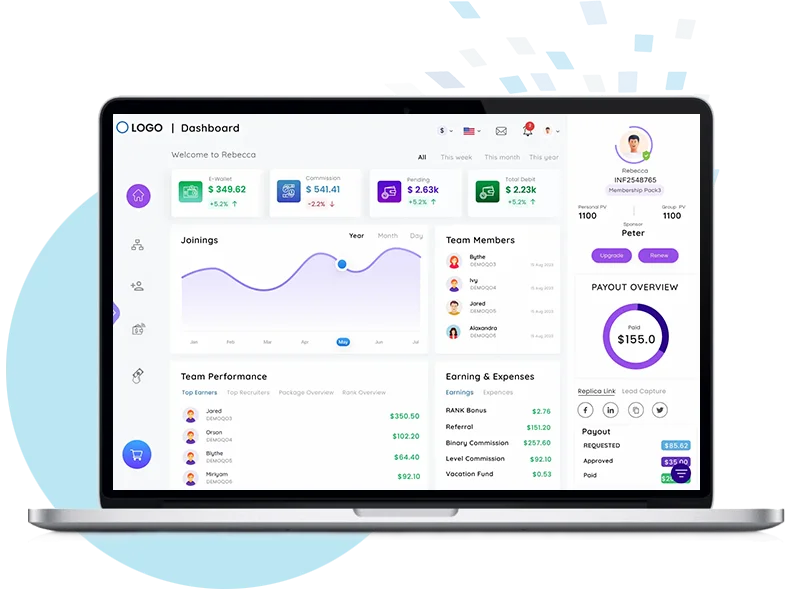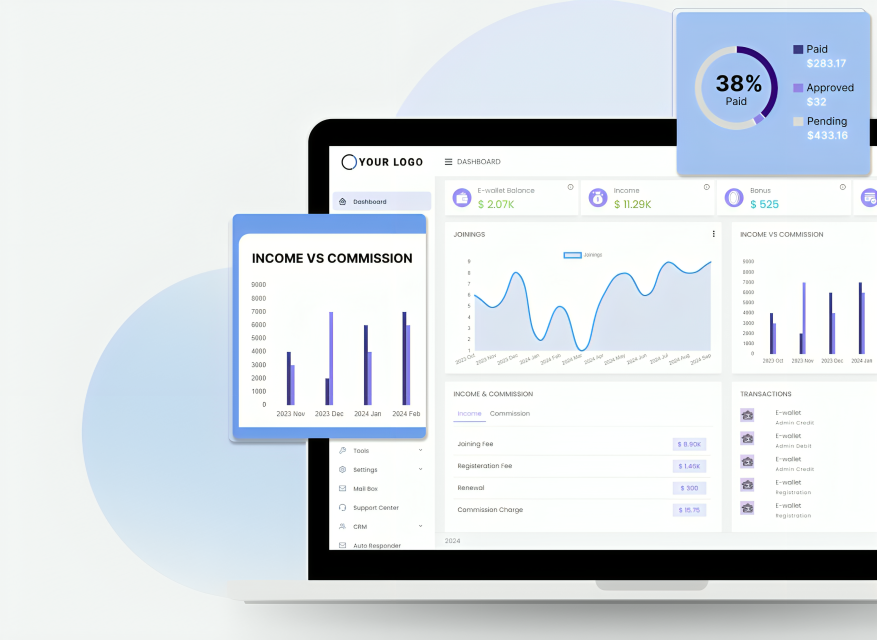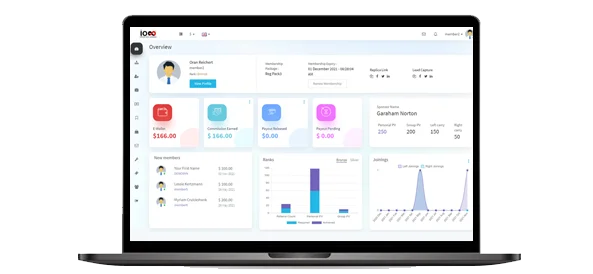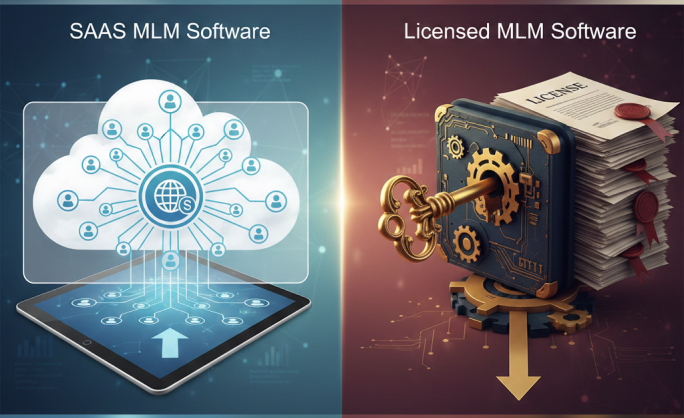Why do over 50% of global e-commerce sales now come from multi-vendor marketplaces and what does that mean for your business?
The rise of platforms like Amazon, Etsy, and Flipkart isn’t accidental. It’s driven by the power of Multi Vendor Ecommerce Software, which enables multiple sellers to operate under one storefront offering wider product variety, faster delivery, and better pricing.
According to Forrester Research, businesses adopting marketplace models see up to 40% lower operational costs and faster scalability. And when combined with MLM software, these systems go a step further; automating commissions, enabling referral sales, and turning vendors into growth partners.
In this growing economy, this blend of flexibility, automation, and community-led selling is not just an upgrade, it’s a must-have.
What is Multi Vendor Marketplace Software?
Multi Vendor Marketplace Software is a platform where multiple sellers can create their profiles and add unlimited products they want to sell. Multi-vendor E-Commerce software, Shopping cart software, or E-Commerce shopping cart software are all programs similar to this software. You must all be familiar with the different retailers selling their products on very popular online portals including Snapdeal, Flipkart, Amazon, etc. With the advantages these platforms offer, numerous independent merchants can create and run their own online businesses within a single marketplace. With the advantages these platforms offer, numerous independent merchants can create and run their own online businesses within a single marketplace.
5 Best Platforms for Multi Vendor Marketplace Software
1. WordPress with Marketify

Marketify is one of the most popular WordPress themes…
-
Vendor Storefronts:
Software for multi-vendor marketplaces gives each seller a customized storefront. This offers a specific area for managing, showcasing, and advertising their goods or services inside the bigger platform. -
Centralized Product Catalogue:
The program combines all of the goods from several vendors into a single catalogue. This gives customers access to a wide range of things in one convenient location. -
Unified Checkout System:
Customers can add goods from several sellers to a single shopping cart through a simplified checkout process, which speeds up transactions and creates a seamless online shopping experience.
Price:
Starter: $750 (Price will vary depending on the template)
2. Magento with Marketplace

Marketplace is one of the popular extensions for Magento. It turns into a fully-functioning multi-vendor marketplace. Magento is one of the most robust multi-vendor E-Commerce platforms we have out there.
- Customization Power:
Magento with Marketplace offers extensive customization for a unique and branded online store. - Scalability Assurance:
This platform ensures seamless growth without sacrificing performance. - Multi-vendor Simplicity:
Facilitating multiple sellers on a single platform, Magento with Marketplace streamlines product management for an enhanced shopping experience.
Price:
Price will be varying depending on templates
3. WordPress with WooCommerce

WooCommerce has several plugins for multi-vendor marketplaces. The most popular of its plugins is WC Vendors plugin because it is well supported and has both free and premium versions.
- Intuitive Content Management:
WordPress with WooCommerce offers a user-friendly system for easy website content management. - Powerful E-commerce Features:
WooCommerce provides secure payment gateways, flexible catalog management, and customizable product pages for robust online stores. - Scalability and Flexibility:
WordPress and WooCommerce scale effortlessly and offer flexibility with themes, plugins, and extensions for evolving business needs.
Price:
Price will be varying depending on templates
4. Sharetribe

Sharetribe is a service that is aimed exclusively to create multi-vendor marketplaces. the main difference of Sharetribe from the other options is that it lets you create a marketplace for all your products, services, or rentals.
- Easy Marketplace Creation:
Sharetribe offers a user-friendly interface for hassle-free marketplace setup without technical expertise. - Customization Flexibility:
Enjoy extensive customization options on Sharetribe to personalize your marketplace according to your brand and business needs. - Secure Transactions:
Sharetribe ensures safe and seamless transactions with integrated payment gateways, fostering trust for buyers and sellers alike.
Price:
Build -$39/Month
Lite -$99/Month, Billed Yearly
Pro – $199/Month, Billed Yearly
Extend– $299/Month, Billed Yearly
5. CS-Cart Multi-Vendor Edition

The multi-vendor version of CS-Cart is full of a number of essential features but is a little on the pricier side. The multi-vendor edition comes with a multi-vendor functionality integrated from the ground up. Hence it feels more cohesive than the others above which rely mostly on extensions.
- Multiple Storefronts:
It is possible to create several distinct stores with CS-Cart multi vendor Edition in a single installation. Sellers can use a single platform to handle all of their individual internet stores. - Advanced Vendor Payout System:
The software ensures a smooth and open payment process by automating vendor payouts based on sales. Sellers profit effectively, and administrators have the ability to alter compensation guidelines. - Powerful Admin Controls:
Admins may effectively manage vendors, items, and the entire multi vendor ecosystem for a successful online marketplace with the help of CS-Cart multi vendor.
Price:
Marketplace Builder On-Premises
Standard – $55/Month, Billed Annually
Plus – $94/Month, Billed Annually
Ultimate – $234/Month, Billed Annually
Unlim – Custom Pricing
Marketplace Builder Cloud
Custom Pricing

From One Store to a Full Marketplace
Turn your single-store setup into a powerful, conversion-focused multi-vendor marketplace; designed to grow as your seller network grows.
start your evolutionHow Does Multi-Vendor Marketplace Software Work?
A multi-vendor marketplace operates through a collaborative ecosystem where the platform owner, vendors, products, and customers all interact within a single, unified system. Here’s a stage-by-stage breakdown of how it functions:

Marketplace Store Owner – The Admin Behind the Platform
The store owner, or marketplace admin, is the central authority who sets up and manages the entire platform using multi-vendor eCommerce software. They define commission rates, approve vendor applications, configure payment gateways, and oversee the platform’s structure. The admin may not sell products directly but earns revenue through commissions, listing fees, or vendor subscriptions.
Vendors – Independent Sellers on a Shared Platform
Vendors join the marketplace to sell their products. After approval, each vendor gets a dedicated dashboard to manage listings, inventory, pricing, shipping options, and customer communication. They operate like individual stores within the main platform, without the need to build or maintain their own eCommerce site.
Multi-Vendor Product Listings – A Centralized Catalog
All products uploaded by vendors are showcased in a unified storefront. Customers can browse across categories, compare similar products from different sellers, and enjoy a wide selection. Each listing includes details like seller name, delivery time, customer reviews, and pricing, ensuring transparency and trust.
eCommerce Marketplace – The Unified Shopping Experience
The marketplace software brings everything together at the front end. Customers can add products from different vendors to one cart and proceed to a single checkout. Behind the scenes, the system splits orders, routes them to respective vendors, calculates commissions, and processes payments, ensuring a seamless experience for all parties.
Customers – The End Users Benefiting from Variety & Convenience
Customers enjoy a rich, flexible shopping experience. They benefit from a wide range of products, competitive pricing, and vendor transparency. They can track orders, rate sellers, and shop from multiple vendors with ease; all within one platform.
More Sellers. More Sales. One Platform.
Run a marketplace that brings together vendors, products, and buyers under one powerful multi-vendor engine; no coding required.

Advantages of Multi Vendor Ecommerce Software
Now that we’ve seen how multi-vendor platforms operate, it’s important to understand the real value they bring to everyone involved. Multi Vendor Ecommerce Software isn’t just about enabling multiple sellers;
it’s about creating a flexible, scalable, and efficient system that benefits platform owners, vendors, and customers alike. Here’s a closer look at the key advantages it offers.
Advantages for Buyers
Extensive Product Variety
Multi vendor platforms bring together multiple sellers under one roof, offering a wide range of products, brands, and categories. Whether a buyer is searching for electronics, clothing, or niche items, they’re more likely to find everything in one place; saving time and effort.
Better Pricing & Deals
When multiple vendors compete for attention, buyers benefit. The competition drives down prices, encourages discounts, and often leads to more flexible offers, creating a win-win for value-conscious shoppers.
One-Stop Checkout
Instead of jumping between different websites, buyers can purchase products from different vendors in a single cart and checkout process, making the experience seamless and hassle-free.
Faster & Localized Delivery
With vendors spread across different regions, buyers often get faster delivery from nearby sellers. Some marketplaces even allow filtering by location or delivery time, improving convenience further.
Credibility through Ratings & Reviews
Buyers can evaluate vendors based on real customer feedback. Transparent reviews and star ratings create a trust-based system that helps users make informed purchase decisions.
Advantages for Vendors
Access to a Ready-Made Customer Base
One of the biggest hurdles for small businesses is visibility. Multi vendor platforms solve this by instantly connecting vendors with thousands (or even millions) of active buyers, without heavy ad spend.
No Technical Hassle
Sellers don’t need to worry about building or maintaining an online store. They can simply sign up, list their products, and start selling; making it ideal for beginners and growing businesses.
Built-In Marketing & SEO Benefits
Most marketplaces already rank well on search engines and run ongoing ad campaigns. This shared traffic helps every vendor gain exposure, even if they’re new to the platform.
Advanced Seller Tools
From inventory and order tracking to payment processing and analytics, vendors get access to a suite of tools. And if the platform integrates MLM software, commissions and referral rewards are handled automatically, enabling scalable business models.
Reputation Building & Repeat Business
Customer reviews and high ratings boost credibility. Over time, top-performing vendors build a loyal customer base, without having to run separate loyalty programs or campaigns.

Scale Without Limits
Go beyond traditional eCommerce. Build a marketplace where vendors grow, customers choose, and your brand leads.
Create Your Multi-Vendor StoreHow to Choose the Right Multi Vendor Ecommerce Software?
Well, since you have decided to utilize the power of a multi vendor marketplace for your MLM business, here’s a breakdown of the factors to consider when choosing multi-vendor software for your MLM business:
- Compatibility and Integration:
Ensure the software works seamlessly with your existing systems (inventory, finance, etc.) and integrates with desired marketing tools. - Customization and Scalability:
The software should adapt to your specific business needs and allow for easy growth as your vendor base and sales expand - User Experience (UX):
A user-friendly interface is crucial for both vendors and customers. It should be intuitive and navigate smoothly for a positive experience. - Comprehensive Features:
Look for software that offers all the functionalities you need, including product management, commission structures, genealogy tracking, and marketing tools. - Support and Reliability:
Choose a provider with excellent customer support to answer questions and troubleshoot issues. Reliable software with minimal downtime is essential. - Cost-Effectiveness:
Consider the total cost of ownership, including upfront fees, monthly subscriptions, and any additional charges. Find a solution that fits your budget and delivers value. - Demonstrations and Trials:
Take advantage of demos and free trials offered by software vendors. This allows you to test the platform, assess its fit for your needs, and ask questions before committing.
Remember:
Choosing the right multi-vendor marketplace software is an investment in your MLM’s future. Take your time, prioritize your needs, and don’t hesitate to reach out to software vendors for demos and consultations.
Why choose us?
Fuel your business growth with Infinite MLM software that goes beyond expectations, offering user-friendly features and unparalleled scalability.

Versatility at Its Core
Infinite MLM Software stands out for its adaptability. Our software serves companies of all sizes, whether they are fledgling ventures or well-established corporations. We provide you the tools to customize your marketplace to fit your unique requirements, from product selection to payment options.

User-Friendly Interface
We believe that complexity should never be a barrier to success. We guarantee that suppliers and customers can utilize our Multi Vendor Ecommerce Software with ease thanks to our user-friendly interface. Make the purchasing and selling process simpler, and you’ll see a sharp rise in customer satisfaction.

Scalability for Growth
Your business is not static, and neither should your ecommerce platform be. Scalability is a key consideration in the design of Infinite MLM Software, allowing for growth without sacrificing functionality. Add products, grow your vendor base, and smoothly scale your business.

Secure Transactions
Security is non-negotiable when it comes to ecommerce. Strong security measures in our multilevel marketing software guarantee that every transaction is secure and encrypted. Gain the confidence of suppliers and clients by using a platform that places a high priority on data protection.

Real-Time Analytics
Make informed business decisions with our real-time analytics. Keep tabs on vendor performance, track sales, and obtain insightful knowledge about consumer behavior. You now have access to the power of data. This enables you to adjust your tactics and maintain your competitive edge.

Effortless Vendor Management
Managing a diverse pool of vendors has never been easier. Infinite MLM Software automates vendor onboarding, communication, and performance tracking. Maintain strong vendor ties to promote a happy marketplace ecosystem.
Future of Multi-Vendor E-commerce Platform
The future of multi-vendor e-commerce platforms is brimming with potential, driven by innovative technologies and a focus on creating an exceptional customer experience. Here are some emerging trends that will reshape the way we shop:
AI-powered Product Recommendations
Artificial intelligence will become an invisible hand, guiding customers towards their perfect purchases. Multi-vendor platforms will leverage AI to analyze customer behavior, purchase history, and browsing patterns. These insights will then be used to generate personalized product recommendations, increasing customer satisfaction and driving sales for vendors.
Voice Commerce Integration
The rise of smart speakers and voice assistants like Google Home and Amazon Echo has paved the way for voice commerce. Multi-vendor platforms will integrate seamlessly with these devices, allowing customers to search for products, compare prices across vendors, and even complete purchases using voice commands. This hands-free shopping experience will offer high convenience, particularly for mobile users.
Blockchain Technology for Secure Transactions
Blockchain offers a secure and decentralized way to store and verify data. In multi-vendor marketplaces, blockchain can revolutionize transaction security. It can streamline the verification process for sellers, eliminate fraud, and provide greater transparency throughout the supply chain. Additionally, blockchain-based smart contracts can automate tasks such as inventory management and payments, further enhancing efficiency within the marketplace.
Hyperlocal Marketplaces
Hyperlocal marketplaces platforms will connect you with local vendors, from fresh produce stands to independent bookstores, all within a designated delivery radius. This fosters a community-driven shopping experience. You can support local businesses you know, while enjoying the convenience of online ordering and possibly faster delivery times since the sellers are nearby.
Conclusion
The importance of multi-vendor ecommerce software cannot be overstated in today’s competitive online marketplace. It enables companies to handle several vendors with ease, optimize processes, and improve the general shopping experience for clients. Software that provides flexibility, scalability, and effective vendor collaboration is essential for the success of e-commerce. As such, adopting multi-vendor solutions is not just a choice but a strategic necessity for businesses aiming to prosper in the world of online retail.










